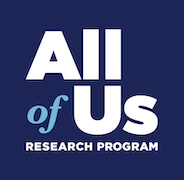
The NIH launched All of Us in 2018 to help build one of the most diverse health databases in history and advance individualized disease prevention, treatment and care for people of all backgrounds.
Four years ago, Emory University joined the nationwide All of Us research program in its mission to help build one of the most inclusive health databases in history. The initiative, funded by the National Institutes of Health (NIH), seeks to enroll one million or more participants across the United States to share data that will advance individualized disease prevention, treatment and care for people of all backgrounds.
The All of Us effort has now enrolled more than 489,900 volunteers. In March, the program released its first genomic dataset, bringing around 100,000 whole genome sequences onto its researcher workbench platform.
Emory researchers played a significant role in this milestone, nurturing relationships with more than 7,000 diverse participants throughout metro Atlanta to ensure strong diversity in the dataset.
Many communities, including racial and ethnic minorities, those who live in rural areas, and LGBTQ+ people, have been historically underrepresented in medical research, resulting in potentially less effective disease prevention and treatment strategies for these groups.
This lack of diversity is especially evident in genomic research: more than 90 percent of participants in genome-wide studies come from European ancestry. The All of Us dataset represents an unprecedented level of diversity, with around 50 percent of participants self-identifying with minority racial and ethnic groups.
The genomic data from All of Us participants is available to registered researchers alongside clinical, lifestyle and wearable data. This combination of data allows researchers to better understand how genes cause or influence diseases in the context of other health determinants, ultimately enabling more precise approaches to care for all populations.
The program’s data browser offers a summary view of genetic data from enrollees. This tool allows users to search for specific genes or variants and see aggregate counts of their frequency in the dataset, along with the genetic ancestry of participants.
Detailed genomic data is available in the controlled tier of the researcher workbench, a higher access level that also includes more granular demographic data and additional electronic health record data. As with all data in the workbench, no direct participant identifiers are included in order to protect participant privacy. Researchers who register for access to this tier can use the data for a wide range of studies.
Health is made up of more than just the DNA inherited or the care received. By bringing these different data types at a scale and level of diversity not previously available, researchers can begin to better understand and address health inequities.
This progress is made possible by the generous contributions of the All of Us participants. Interested participants may also choose to receive individual ancestry, traits and health-related DNA results that they can share with their health care providers.
To learn more about the All of Us researcher workbench or to register for access, go to ResearchAllofUs.org. To learn more about the All of Us research program, visit allofus.emory.edu.
About All of Us
The NIH launched All of Us in 2018 to help build one of the most diverse health databases in history and advance individualized disease prevention, treatment and care for people of all backgrounds. The program aims to enroll more than a million people across the United States.
Emory University is part of the SouthEast Enrollment Center (SEEC) of All of Us, which has now enrolled nearly 40,000 collective participants since the launch. The Emory section of the research is being conducted at clinical locations throughout Emory Healthcare — cardiology and orthopaedics clinics in Executive Park, Emory Decatur Hospital, Emory Hillandale Hospital, Emory Saint Joseph's Hospital, outpatient clinics at Emory University Hospital, and at the Wesley Woods Health Center. In addition to Emory, the SEEC network includes Morehouse School of Medicine, the University of Miami Miller School of Medicine and the OneFlorida Clinical Research Consortium led by the University of Florida.
People ages 18 and older, regardless of health status, can enroll. The aim of All of Us is to involve individuals from all communities, including those who have been underrepresented in other research studies, to make the program the largest, most inclusive resource of its kind.
